#sql interview questions
Explore tagged Tumblr posts
Text
Your Guide To SQL Interview Questions for Data Analyst

Introduction
A Data Analyst collects, processes, and analyses data to help companies make informed decisions. SQL is crucial because it allows analysts to efficiently retrieve and manipulate data from databases.
This article will help you prepare for SQL interview questions for Data Analyst positions. You'll find common questions, detailed answers, and practical tips to excel in your interview.
Whether you're a beginner or looking to improve your skills, this guide will provide valuable insights and boost your confidence in tackling SQL interview questions for Data Analyst roles.
Importance Of SQL Skills In Data Analysis Roles
Understanding SQL is crucial for Data Analysts because it enables them to retrieve, manipulate, and manage large datasets efficiently. SQL skills are essential for accurate Data Analysis, generating insights, and making informed decisions. Let's explore why SQL is so important in Data Analysis roles.
Role Of SQL In Data Retrieval, Manipulation, and Management
SQL, or Structured Query Language, is the backbone of database management. It allows Data Analysts to pull data from databases (retrieval), change this data (manipulation), and organise it effectively (management).
Using SQL, analysts can quickly find specific data points, update records, or even delete unnecessary information. This capability is essential for maintaining clean and accurate datasets.
Common Tasks That Data Analysts Perform Using SQL
Data Analysts use SQL to perform various tasks. They often write queries to extract specific data from databases, which helps them answer business questions and generate reports.
Analysts use SQL to clean and prepare data by removing duplicates and correcting errors. They also use it to join data from multiple tables, enabling a comprehensive analysis. These tasks are fundamental in ensuring data accuracy and relevance.
Examples Of How SQL Skills Can Solve Real-World Data Problems
SQL skills help solve many real-world problems. For instance, a retail company might use SQL to analyse sales data and identify the best-selling products. A marketing analyst could use SQL to segment customers based on purchase history, enabling targeted marketing campaigns.
SQL can also help detect patterns and trends, such as identifying peak shopping times or understanding customer preferences, which are critical for strategic decision-making.
Why Employers Value SQL Proficiency in Data Analysts
Employers highly value SQL skills because they ensure Data Analysts can work independently with large datasets. Proficiency in SQL means an analyst can extract meaningful insights without relying on other technical teams. This capability speeds up decision-making and problem-solving processes, making the business more agile and responsive.
Additionally, SQL skills often indicate logical, solid thinking and attention to detail, which are highly desirable qualities in any data-focused role.
Basic SQL Interview Questions
Employers often ask basic questions in SQL interviews for Data Analyst positions to gauge your understanding of fundamental SQL concepts. These questions test your ability to write and understand simple SQL queries, essential for any Data Analyst role. Here are some common basic SQL interview questions, along with their answers:
How Do You Retrieve Data From A Single Table?
Answer: Use the `SELECT` statement to retrieve data from a table. For example, `SELECT * FROM employees;` retrieves all columns from the "employees" table.
What Is A Primary Key?
Answer: A primary key is a unique identifier for each record in a table. It ensures that no two rows have the same key value. For example, in an "employees" table, the employee ID can be the primary key.
How Do You Filter Records In SQL?
Answer: Use the `WHERE` clause to filter records. For example, `SELECT * FROM employees WHERE department = 'Sales';` retrieves all employees in the Sales department.
What Is The Difference Between `WHERE` And `HAVING` Clauses?
Answer: The `WHERE` clause filters rows before grouping, while the `HAVING` clause filters groups after the `GROUP BY` operation. For example, `SELECT department, COUNT(*) FROM employees GROUP BY department HAVING COUNT(*) > 10;` filters departments with more than ten employees.
How Do You Sort Data in SQL?
Answer: Use the `ORDER BY` clause to sort data. For example, `SELECT * FROM employees ORDER BY salary DESC;` sorts employees by salary in descending order.
How Do You Insert Data Into A Table?
Answer: Use the `INSERT INTO` statement. For example, `INSERT INTO employees (name, department, salary) VALUES ('John Doe', 'Marketing', 60000);` adds a new employee to the "employees" table.
How Do You Update Data In A Table?
Answer: Use the `UPDATE` statement. For example, `UPDATE employees SET salary = 65000 WHERE name = 'John Doe';` updates John Doe's salary.
How Do You Delete Data From A Table?
Answer: Use the `DELETE` statement. For example, `DELETE FROM employees WHERE name = 'John Doe';` removes John Doe's record from the "employees" table.
What Is A Foreign Key?
Answer: A foreign key is a field in one table that uniquely identifies a row in another table. It establishes a link between the two tables. For example, a "department_id" in the "employees" table that references the "departments" table.
How Do You Use The `LIKE` Operator?
Answer: SQL's `LIKE` operator is used for pattern matching. For example, `SELECT * FROM employees WHERE name LIKE 'J%';` retrieves all employees whose names start with 'J'.
Must Read:
How to drop a database in SQL server?
Advanced SQL Interview Questions
In this section, we delve into more complex aspects of SQL that you might encounter during a Data Analyst interview. Advanced SQL questions test your deep understanding of database systems and ability to handle intricate data queries. Here are ten advanced SQL questions and their answers to help you prepare effectively.
What Is The Difference Between INNER JOIN And OUTER JOIN?
Answer: An INNER JOIN returns rows when there is a match in both tables. An OUTER JOIN returns all rows from one table and the matched rows from the other. If there is no match, the result is NULL on the side where there is no match.
How Do You Use A Window Function In SQL?
Answer: A window function calculates across a set of table rows related to the current row. For example, to calculate the running total of salaries:

Explain The Use Of CTE (Common Table Expressions) In SQL.
Answer: A CTE allows you to define a temporary result set that you can reference within a SELECT, INSERT, UPDATE, or DELETE statement. It is defined using the WITH clause:
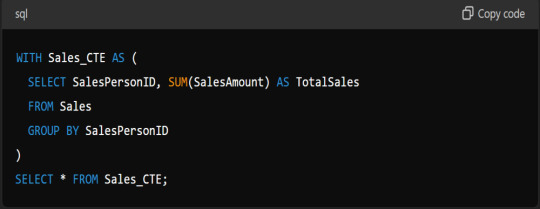
What Are Indexes, And How Do They Improve Query Performance?
Answer: Indexes are database objects that improve the speed of data retrieval operations on a table. They work like the index in a book, allowing the database engine to find data quickly without scanning the entire table.
How Do You Find The Second-highest Salary In A Table?
Answer: You can use a subquery for this:
What Is A Subquery, And When Would You Use One?
Answer: A subquery is a query nested inside another query. You use it when you need to filter results based on the result of another query:

Explain The Use Of GROUP BY And HAVING Clauses.
Answer: GROUP BY groups rows sharing a property so that aggregate functions can be applied to each group. HAVING filters groups based on aggregate properties:

How Do You Optimise A Slow Query?
Answer: To optimise a slow query, you can:
Use indexes to speed up data retrieval.
Avoid SELECT * by specifying only necessary columns.
Break down complex queries into simpler parts.
Analyse query execution plans to identify bottlenecks.
Describe A Scenario Where You Would Use A LEFT JOIN.
Answer: Use a LEFT JOIN when you need all records from the left table and the matched records from the right table. For example, to find all customers and their orders, even if some customers have no orders:

What Is A Stored Procedure, And How Do You Create One?
Answer: A stored procedure is a prepared SQL code you can reuse. It encapsulates SQL queries and logic in a single function:
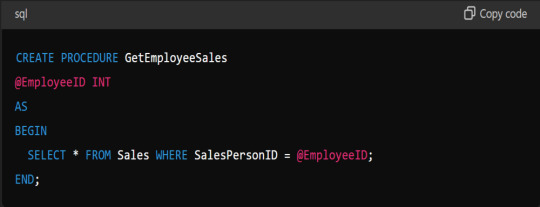
These advanced SQL questions and answers will help you demonstrate your proficiency and problem-solving skills during your Data Analyst interview.
Practical Problem-Solving Scenarios SQL Questions
In SQL interviews for Data Analyst roles, you’ll often face questions that test your ability to solve real-world problems using SQL. These questions go beyond basic commands and require you to think critically and apply your knowledge to complex scenarios. Here are ten practical SQL questions with answers to help you prepare.
How Would You Find Duplicate Records In A Table Named `Employees` Based On The `Email` Column?
Answer:
Write A Query To Find The Second Highest Salary In A Table Named `Salaries`.
Answer:

How Do You Handle NULL Values In SQL When Calculating The Total Salary In The `Employees` Table?
Answer:

Create A Query To Join The `Employees` Table And `Departments` Table On The `Department_id` And Calculate The Total Salary Per Department.
Answer:
How Do You Find Employees Who Do Not Belong To Any Department?
Answer:
Write A Query To Retrieve The Top 3 Highest-paid Employees From The `Employees` Table.
Answer:
How Do You Find Employees Who Joined In The Last Year?
Answer:
Calculate The Average Salary Of Employees In The `Employees` Table, Excluding Those With A Wage Below 3000.
Answer:
Update The Salary By 10% For Employees In The `Employees` Table Who Work In The 'Sales' Department.
Answer:
Delete Records Of Employees Who Have Not Been Active For The Past 5 years.
Answer:
These questions cover a range of scenarios you might encounter in an SQL interview. Practice these to enhance your problem-solving skills and better prepare for your interview.
Tips for Excelling in SQL Interviews
Understanding how to excel in SQL interviews is crucial for aspiring data professionals, as it showcases technical expertise and problem-solving skills and enhances job prospects in a competitive industry. Excelling in SQL interviews requires preparation and practice. Here are some tips to help you stand out and perform your best.
Best Practices for Preparing for SQL Interviews
Preparation is critical to success in SQL interviews. Start by reviewing the basics of SQL, including common commands and functions. Practice writing queries to solve various problems.
Ensure you understand different types of joins, subqueries, and aggregate functions. Mock interviews can also be helpful. They simulate the real interview environment and help you get comfortable answering questions under pressure.
Resources for Improving SQL Skills
Knowing about resources for improving SQL skills enhances data management proficiency and boosts career prospects. It also facilitates complex Data Analysis and empowers you to handle large datasets efficiently. There are many resources available to help you improve your SQL skills. Here are a few:
Books: "SQL For Dummies" by Allen G. Taylor is a great start. "Learning SQL" by Alan Beaulieu is another excellent resource.
Online Courses: Many websites offer comprehensive SQL courses. Explore platforms that provide interactive SQL exercises.
Practice Websites: LeetCode, HackerRank, and SQLZoo offer practice problems that range from beginner to advanced levels. Regularly solving these problems will help reinforce your knowledge and improve your problem-solving skills.
Importance of Understanding Business Context and Data Interpretation
Understanding the business context is crucial in addition to technical skills. Employers want to know that you can interpret data and provide meaningful insights.
Familiarise yourself with the business domain relevant to the job you are applying for. Practice explaining your SQL queries and the insights they provide in simple terms. This will show that you can communicate effectively with non-technical stakeholders.
Tips for Writing Clean and Efficient SQL Code
Knowing tips for writing clean and efficient SQL code ensures better performance, maintainability, and readability. It also leads to optimised database operations and easier collaboration among developers. Writing clean and efficient SQL code is essential in interviews. Follow these tips:
Use Clear and Descriptive Names: Use meaningful names for tables, columns, and aliases. This will make your queries more straightforward to read and understand.
Format Your Code: Use indentation and line breaks to organise your query. It improves readability and helps you spot errors more easily.
Optimise Your Queries: Use indexing, limit the use of subqueries, and avoid unnecessary columns in your SELECT statements. Efficient queries run faster and use fewer resources.
Common Pitfalls to Avoid During the Interview
Knowing common interview pitfalls is crucial to present your best self and avoid mistakes. It further increases your chances of securing the job you desire. Preparation is key. Here's how you can avoid some common mistakes during the interview:
Not Reading the Question Carefully: Ensure you understand the interviewer's question before writing your query.
Overcomplicating the Solution: Start with a simple solution and build on it if necessary. Avoid adding unnecessary complexity.
Ignoring Edge Cases: Consider edge cases and test your queries with different datasets. It shows that you think critically about your solutions.
By following these tips, you'll be well-prepared to excel in your SQL interviews. Practice regularly, use available resources, and focus on clear, efficient coding. Understanding the business context and avoiding common pitfalls will help you stand out as a strong candidate.
Read Further:
Advanced SQL Tips and Tricks for Data Analysts.
Conclusion
Preparing for SQL interviews is vital for aspiring Data Analysts. Understanding SQL fundamentals, practising query writing, and solving real-world problems are essential.
Enhance your skills using resources such as books, online courses, and practice websites. Focus on writing clean, efficient code and interpreting data within a business context.
Avoid common pitfalls by reading questions carefully and considering edge cases. By following these guidelines, you can excel in your SQL interviews and secure a successful career as a Data Analyst.
#sql interview questions#sql tips and tricks#sql tips#sql in data analysis#sql#data analyst interview questions#sql interview#sql interview tips for data analysts#data science#pickl.ai#data analyst
1 note
·
View note
Text
#Azure Data Factory#azure data factory interview questions#adf interview question#azure data engineer interview question#pyspark#sql#sql interview questions#pyspark interview questions#Data Integration#Cloud Data Warehousing#ETL#ELT#Data Pipelines#Data Orchestration#Data Engineering#Microsoft Azure#Big Data Integration#Data Transformation#Data Migration#Data Lakes#Azure Synapse Analytics#Data Processing#Data Modeling#Batch Processing#Data Governance
1 note
·
View note
Text
SQL practical Interview Querys
Sql Quries SQL Quries

View On WordPress
0 notes
Text
How SQL Coding Classes Help Developers Work Smarter
Web developers and software engineers can greatly benefit from SQL coding classes. Managing backend systems and working with relational databases are daily tasks in development roles. SQL coding classes teach you how to create, update, and manage data effectively using SQL. You’ll also learn to integrate SQL into apps and understand how database performance affects user experience. With the skills you gain, you’ll write cleaner code and build more efficient software systems that scale easily.
#mysql viva questions#sql basics for interview#sql database for practice#sql coding classes#software testing sql interview questions
0 notes
Text

what is msbi course , msbi vs power bi Excel in Business Intelligence with our MSBI Certification Training online. Specialized in SSIS, SSAS, SSRS. Elevate your skills for success.
msbi tutorial for beginners , msbi interview questions , what is msbi course , msbi certification training course online ssis ssas ssrs , msbi online course
#msbi tutorial for beginners#msbi interview questions#what is msbi course#msbi certification training course online ssis ssas ssrs#msbi online course#data analytics#msbi#sql#power bi course#power bi course fees#power bi online training#power bi certification#power bi certification cost#education#power bi
1 note
·
View note
Text
A Preparation Guide to SQL Interviews
In today’s increasingly data-driven world, SQL (Structured Query Language) skills are highly valued by employers. To excel in SQL interviews, proper preparation for SQL query interview questions is crucial. This blog post will explore various strategies for effectively preparing for SQL interviews. We will discuss the importance of understanding SQL fundamentals, mastering query optimization…

View On WordPress
0 notes
Text
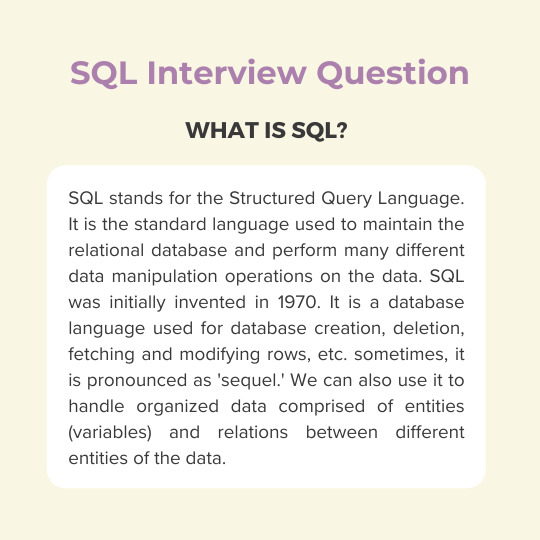
SQL Interview Question . . . For more interview questions https://bit.ly/3RLDWt9 check the above link
2 notes
·
View notes
Text
01/11/2023 || Day 104
Personal Chatter
I love that yesterday I was pumped and ready for November and preparing to be productive, and yet today I woke up feeling bad so productivity was low. That's ok, tmr will be better! I also had another ASL class today and the teacher brought us chocolate (and the better thing is that we already know the sign for chocolate before, so we could use that in a sentence today). We've learned about 500 words (do we remember them all? lol, nope), and it's been such a fun class, so I already signed up for the next unit of the class for January.
------------------------------------------------------------------------------
Programming
Even though I didn't feel great today, I did get some stuff done!
LeetCode
Decided to start off with an easy LeetCode question, so I went with Number of Good Pairs and 5 mins later I was done. I previously did the Top Interview 150 questions, but I want more practice with Arrays/Strings, so I'm just doing those types now. Will move onto sorting and binary search trees and linked lists later (once I feel smart again).
Hobby Tracker - Log # 1
Ok, I decided what my full-stack project will be. I want to create a web app in which a user can keep track of different media they want to consume; books, movies, TV shows, and video games. Essentially, I want something that will show me how many things I want to get to (i.e how many books I want to read), and what those things specifically are, and then show me how much of each media type I've completed. For example, I have a spreadsheet of video games I own and I have it show me the % of complete games. I want that, but for all books, movies, shows, and games I enter. Not only that, but for certain media, I want to be able to get a random title from my list. Say I have 20 books I want to read but don't know which to pick. Well, I can ask it to choose a book for me randomly, and I'll read it. That's the basic idea, anyways. Today I spent some time setting up a Trello board to keep track of features I want and functionality I need, and I also started designing the mobile version of the app using Figma. It'll probably be a while before I start coding, but the idea is to have the frontend be built with React, backend with NodeJs, and database be SQL. I'll also be using APIs to get the media info, such as title, genre, etc...This will be the biggest project in terms of scope I've worked on, but hopefully I'll learn a lot.
6 notes
·
View notes
Text
Unlock Success: MySQL Interview Questions with Olibr
Introduction
Preparing for a MySQL interview requires a deep understanding of database concepts, SQL queries, optimization techniques, and best practices. Olibr’s experts provide insightful answers to common mysql interview questions, helping candidates showcase their expertise and excel in MySQL interviews.
1. What is MySQL, and how does it differ from other database management systems?
Olibr’s Expert Answer: MySQL is an open-source relational database management system (RDBMS) that uses SQL (Structured Query Language) for managing and manipulating databases. It differs from other DBMS platforms in its open-source nature, scalability, performance optimizations, and extensive community support.
2. Explain the difference between InnoDB and MyISAM storage engines in MySQL.
Olibr’s Expert Answer: InnoDB and MyISAM are two commonly used storage engines in MySQL. InnoDB is transactional and ACID-compliant, supporting features like foreign keys, row-level locking, and crash recovery. MyISAM, on the other hand, is non-transactional, faster for read-heavy workloads, but lacks features such as foreign keys and crash recovery.
3. What are indexes in MySQL, and how do they improve query performance?
Olibr’s Expert Answer: Indexes are data structures that improve query performance by allowing faster retrieval of rows based on indexed columns. They reduce the number of rows MySQL must examine when executing queries, speeding up data retrieval operations, and optimizing database performance.
4. Explain the difference between INNER JOIN and LEFT JOIN in MySQL.
Olibr’s Expert Answer: INNER JOIN and LEFT JOIN are SQL join types used to retrieve data from multiple tables. INNER JOIN returns rows where there is a match in both tables based on the join condition. LEFT JOIN returns all rows from the left table and matching rows from the right table, with NULL values for non-matching rows in the right table.
5. What are the advantages of using stored procedures in MySQL?
Olibr’s Expert Answer: Stored procedures in MySQL offer several advantages, including improved performance due to reduced network traffic, enhanced security by encapsulating SQL logic, code reusability across applications, easier maintenance and updates, and centralized database logic execution.
Conclusion
By mastering these MySQL interview questions and understanding Olibr’s expert answers, candidates can demonstrate their proficiency in MySQL database management, query optimization, and best practices during interviews. Olibr’s insights provide valuable guidance for preparing effectively, showcasing skills, and unlocking success in MySQL-related roles.
2 notes
·
View notes
Text
SQL Temporary Table | Temp Table | Global vs Local Temp Table
Q01. What is a Temp Table or Temporary Table in SQL? Q02. Is a duplicate Temp Table name allowed? Q03. Can a Temp Table be used for SELECT INTO or INSERT EXEC statement? Q04. What are the different ways to create a Temp Table in SQL? Q05. What is the difference between Local and Global Temporary Table in SQL? Q06. What is the storage location for the Temp Tables? Q07. What is the difference between a Temp Table and a Derived Table in SQL? Q08. What is the difference between a Temp Table and a Common Table Expression in SQL? Q09. How many Temp Tables can be created with the same name? Q10. How many users or who can access the Temp Tables? Q11. Can you create an Index and Constraints on the Temp Table? Q12. Can you apply Foreign Key constraints to a temporary table? Q13. Can you use the Temp Table before declaring it? Q14. Can you use the Temp Table in the User-Defined Function (UDF)? Q15. If you perform an Insert, Update, or delete operation on the Temp Table, does it also affect the underlying base table? Q16. Can you TRUNCATE the temp table? Q17. Can you insert the IDENTITY Column value in the temp table? Can you reset the IDENTITY Column of the temp table? Q18. Is it mandatory to drop the Temp Tables after use? How can you drop the temp table in a stored procedure that returns data from the temp table itself? Q19. Can you create a new temp table with the same name after dropping the temp table within a stored procedure? Q20. Is there any transaction log created for the operations performed on the Temp Table? Q21. Can you use explicit transactions on the Temp Table? Does the Temp Table hold a lock? Does a temp table create Magic Tables? Q22. Can a trigger access the temp tables? Q23. Can you access a temp table created by a stored procedure in the same connection after executing the stored procedure? Q24. Can a nested stored procedure access the temp table created by the parent stored procedure? Q25. Can you ALTER the temp table? Can you partition a temp table? Q26. Which collation will be used in the case of Temp Table, the database on which it is executing, or temp DB? What is a collation conflict error and how you can resolve it? Q27. What is a Contained Database? How does it affect the Temp Table in SQL? Q28. Can you create a column with user-defined data types (UDDT) in the temp table? Q29. How many concurrent users can access a stored procedure that uses a temp table? Q30. Can you pass a temp table to the stored procedure as a parameter?
#sqlinterview#sqltemptable#sqltemporarytable#sqltemtableinterview#techpointinterview#techpointfundamentals#techpointfunda#techpoint#techpointblog
4 notes
·
View notes
Text
GROKKING THE SQL INTERVIEW
SQL Guide 📚📚Download
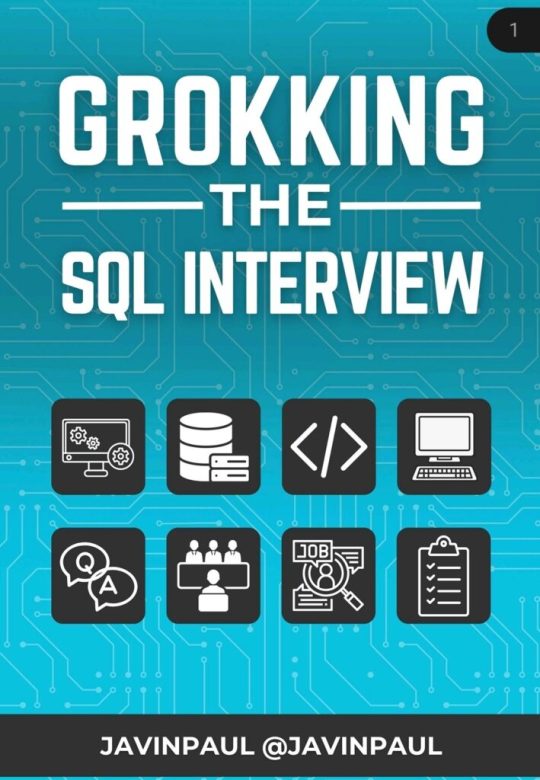
View On WordPress
0 notes
Text

SQL Interview Questions
The following SQL interview questions and answers are designed to familiarize candidates with common interview questions.
#besttraininginstitute#traininginstitute#onlinetraining#training#online#coding#tutorial#technology#trending#design#infographics#sql#mysql#database#programming#engineering
5 notes
·
View notes
Text
msbi certification training course online ssis ssas ssrs Excel in Business Intelligence with our MSBI Certification Training online. Specialized in SSIS, SSAS, SSRS. Elevate your skills for success.
msbi tutorial for beginners , msbi interview questions , what is msbi course , msbi certification training course online ssis ssas ssrs , msbi online course | msbi online training
#msbi tutorial for beginners#msbi interview questions#what is msbi course#msbi certification training course online ssis ssas ssrs#msbi online course | msbi online training#data analytics#power bi certification#power bi certification cost#power bi course#power bi course fees#sql#power bi#power bi online training#education#msbi
1 note
·
View note
Text
Dream of Dungeon Crawling and programming questions
I dreamt last night that I was playing this game that looked a lot like TES1: Arena as this first person pixelated game. I was making my way through a castle that was several stories tall. I had to start from the top of the castle and make my way to the button.
Every other room has an enemy for me to deal with. Except whenever I encountered an enemy, the game rolls a die to determine which approach I have to take. So depending on what the game rolls, I either have to fight the enemy, sneak past them Tom and Jerry style, talk my way past the enemy, or solve a Python interview question or solve a SQL interview question (questions such as “Write Python Code to determine if a String is a Palindrome” or “Write SQL code to to find the Second Highest Salary from a Table”). Every time I defeated an enemy, I got some gold, xp and loot.
I managed to make it all the way to the final door to be able to exit the castle when I failed a melee roll and got killed by being stabbed by some weird goblin looking thing. The pain felt really real. Like I really was being stabbed. I woke up shortly afterwards around 8am. That wasn’t great as I had work that day and would have liked to get some more sleep in.
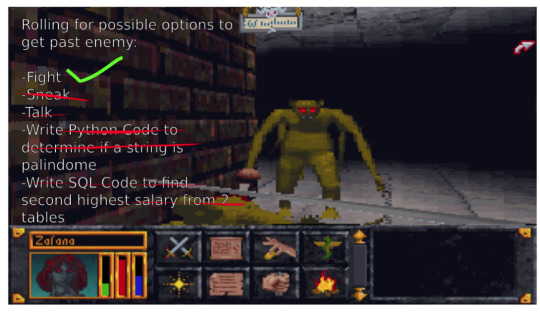
4 notes
·
View notes
Text
How To Get An Online Internship In the IT Sector (Skills And Tips)

Internships provide invaluable opportunities to gain practical skills, build professional networks, and get your foot in the door with top tech companies.
With remote tech internships exploding in IT, online internships are now more accessible than ever. Whether a college student or career changer seeking hands-on IT experience, virtual internships allow you to work from anywhere.
However, competition can be fierce, and simply applying is often insufficient. Follow this comprehensive guide to develop the right technical abilities.
After reading this, you can effectively showcase your potential, and maximize your chances of securing a remote tech internship.
Understand In-Demand IT Skills
The first step is gaining a solid grasp of the most in-demand technical and soft skills. While specific requirements vary by company and role, these competencies form a strong foundation:
Technical Skills:
Proficiency in programming languages like Python, JavaScript, Java, and C++
Experience with front-end frameworks like React, Angular, and Vue.js
Back-end development skills - APIs, microservices, SQL databases Cloud platforms such as AWS, Azure, Google Cloud
IT infrastructure skills - servers, networks, security
Data science abilities like SQL, R, Python
Web development and design
Mobile app development - Android, iOS, hybrid
Soft Skills:
Communication and collaboration
Analytical thinking and problem-solving
Leadership and teamwork
Creativity and innovation
Fast learning ability
Detail and deadline-oriented
Flexibility and adaptability
Obtain Relevant Credentials
While hands-on skills hold more weight, relevant academic credentials and professional IT certifications can strengthen your profile. Consider pursuing:
Bachelor’s degree in Computer Science, IT, or related engineering fields
Internship-specific courses teaching technical and soft skills
Certificates like CompTIA, AWS, Cisco, Microsoft, Google, etc.
Accredited boot camp programs focusing on applied skills
MOOCs to build expertise in trending technologies like AI/ML, cybersecurity
Open source contributions on GitHub to demonstrate coding skills
The right credentials display a work ethic and supplement practical abilities gained through projects.
Build An Impressive Project Portfolio
Nothing showcases skills better than real-world examples of your work. Develop a portfolio of strong coding, design, and analytical projects related to your target internship field.
Mobile apps - publish on app stores or use GitHub project pages
Websites - deploy online via hosting services
Data science - showcase Jupyter notebooks, visualizations
Open source code - contribute to public projects on GitHub
Technical writing - blog posts explaining key concepts
Automation and scripts - record demo videos
Choose projects demonstrating both breadth and depth. Align them to skills required for your desired internship roles.
Master Technical Interview Skills
IT internship interviews often include challenging technical questions and assessments. Be prepared to:
Explain your code and projects clearly. Review them beforehand.
Discuss concepts related to key technologies on your resume. Ramp up on fundamentals.
Solve coding challenges focused on algorithms, data structures, etc. Practice online judges like LeetCode.
Address system design and analytical problems. Read case interview guides.
Show communication and collaboration skills through pair programming tests.
Ask smart, well-researched questions about the company’s tech stack, projects, etc.
Schedule dedicated time for technical interview practice daily. Learn to think aloud while coding and get feedback from peers.
Show Passion and Curiosity
Beyond raw skills, demonstrating genuine passion and curiosity for technology goes a long way.
Take online courses and certifications beyond the college curriculum
Build side projects and engage in hackathons for self-learning
Stay updated on industry news, trends, and innovations
Be active on forums like StackOverflow to exchange knowledge
Attend tech events and conferences
Participate in groups like coding clubs and prior internship programs
Follow tech leaders on social mediaListen to tech podcasts while commuting
Show interest in the company’s mission, products, and culture
This passion shines through in interviews and applications, distinguishing you from other candidates.
Promote Your Personal Brand
In the digital age, your online presence and personal brand are make-or-break. Craft a strong brand image across:
LinkedIn profile - showcase achievements, skills, recommendations
GitHub - displays coding activity and quality through clean repositories
Portfolio website - highlight projects and share valuable content
Social media - post career updates and useful insights, but avoid oversharing
Blogs/videos - demonstrate communication abilities and thought leadership
Online communities - actively engage and build relationships
Ensure your profiles are professional and consistent. Let your technical abilities and potential speak for themselves.
Optimize Your Internship Applications
Applying isn’t enough. You must optimize your internship applications to get a reply:
Ensure you apply to openings that strongly match your profile Customize your resume and cover letters using keywords in the job description
Speak to skills gained from coursework, online learning, and personal projects
Quantify achievements rather than just listing responsibilities
Emphasize passion for technology and fast learning abilities
Ask insightful questions that show business understanding
Follow up respectfully if you don’t hear back in 1-2 weeks
Show interest in full-time conversion early and often
Apply early since competitive openings close quickly
Leverage referrals from your network if possible
This is how you do apply meaningfully. If you want a good internship, focus on the quality of applications. The hard work will pay off.
Succeed in Your Remote Internship
The hard work pays off when you secure that long-awaited internship! Continue standing out through the actual internship by:
Over Communicating in remote settings - proactively collaborate
Asking smart questions and owning your learning
Finding mentors and building connections remotely
Absorbing constructive criticism with maturity
Shipping quality work on or before deadlines
Clarifying expectations frequently
Going above and beyond prescribed responsibilities sometimes
Getting regular feedback and asking for more work
Leaving with letters of recommendation and job referrals
When you follow these tips, you are sure to succeed in your remote internship. Remember, soft skills can get you long ahead in the company, sometimes core skills can’t.
Conclusion
With careful preparation, tenacity, and a passion for technology, you will be able to get internships jobs in USA that suit your needs in the thriving IT sector.
Use this guide to build the right skills, create an impressive personal brand, ace the applications, and excel in your internship.
Additionally, you can browse some good job portals. For instance, GrandSiren can help you get remote tech internships. The portal has the best internship jobs in India and USA you’ll find. The investment will pay dividends throughout your career in this digital age. Wishing you the best of luck! Let me know in the comments about your internship hunt journey.
#itjobs#internship opportunities#internships#interns#entryleveljobs#gradsiren#opportunities#jobsearch#careeropportunities#jobseekers#ineffable interns#jobs#employment#career
4 notes
·
View notes
Text
How To Get An Online Internship In the IT Sector (Skills And Tips)

Internships provide invaluable opportunities to gain practical skills, build professional networks, and get your foot in the door with top tech companies.
With remote tech internships exploding in IT, online internships are now more accessible than ever. Whether a college student or career changer seeking hands-on IT experience, virtual internships allow you to work from anywhere.
However, competition can be fierce, and simply applying is often insufficient. Follow this comprehensive guide to develop the right technical abilities.
After reading this, you can effectively showcase your potential, and maximize your chances of securing a remote tech internship.
Understand In-Demand IT Skills
The first step is gaining a solid grasp of the most in-demand technical and soft skills. While specific requirements vary by company and role, these competencies form a strong foundation:
Technical Skills:
>> Proficiency in programming languages like Python, JavaScript, Java, and C++ >> Experience with front-end frameworks like React, Angular, and Vue.js >> Back-end development skills - APIs, microservices, SQL databases >> Cloud platforms such as AWS, Azure, Google Cloud >> IT infrastructure skills - servers, networks, security >> Data science abilities like SQL, R, Python >> Web development and design >> Mobile app development - Android, iOS, hybrid
Soft Skills:
>> Communication and collaboration >> Analytical thinking and problem-solving >> Leadership and teamwork >> Creativity and innovation >> Fast learning ability >> Detail and deadline-oriented >> Flexibility and adaptability
Obtain Relevant Credentials
While hands-on skills hold more weight, relevant academic credentials and professional IT certifications can strengthen your profile. Consider pursuing:
>> Bachelor’s degree in Computer Science, IT, or related engineering fields. >> Internship-specific courses teaching technical and soft skills. >> Certificates like CompTIA, AWS, Cisco, Microsoft, Google, etc. >> Accredited boot camp programs focusing on applied skills. >> MOOCs to build expertise in trending technologies like AI/ML, cybersecurity. >> Open source contributions on GitHub to demonstrate coding skills.
The right credentials display a work ethic and supplement practical abilities gained through projects.
Build An Impressive Project Portfolio
Nothing showcases skills better than real-world examples of your work. Develop a portfolio of strong coding, design, and analytical projects related to your target internship field.
>> Mobile apps - publish on app stores or use GitHub project pages >> Websites - deploy online via hosting services >> Data science - showcase Jupyter notebooks, visualizations >> Open source code - contribute to public projects on GitHub >> Technical writing - blog posts explaining key concepts >> Automation and scripts - record demo videos
Choose projects demonstrating both breadth and depth. Align them to skills required for your desired internship roles.
Master Technical Interview Skills
IT internship interviews often include challenging technical questions and assessments. Be prepared to:
>> Explain your code and projects clearly. Review them beforehand. >> Discuss concepts related to key technologies on your resume. Ramp up on fundamentals. >> Solve coding challenges focused on algorithms, data structures, etc. Practice online judges like LeetCode. >> Address system design and analytical problems. Read case interview guides. >> Show communication and collaboration skills through pair programming tests. >> Ask smart, well-researched questions about the company’s tech stack, projects, etc.
Schedule dedicated time for technical interview practice daily. Learn to think aloud while coding and get feedback from peers.
Show Passion and Curiosity
Beyond raw skills, demonstrating genuine passion and curiosity for technology goes a long way.
>> Take online courses and certifications beyond the college curriculum >> Build side projects and engage in hackathons for self-learning >> Stay updated on industry news, trends, and innovations >> Be active on forums like StackOverflow to exchange knowledge >> Attend tech events and conferences >> Participate in groups like coding clubs and prior internship programs >> Follow tech leaders on social media >> Listen to tech podcasts while commuting >> Show interest in the company’s mission, products, and culture
This passion shines through in interviews and applications, distinguishing you from other candidates.
Promote Your Personal Brand
In the digital age, your online presence and personal brand are make-or-break. Craft a strong brand image across:
>> LinkedIn profile - showcase achievements, skills, recommendations >> GitHub - displays coding activity and quality through clean repositories >> Portfolio website - highlight projects and share valuable content >> Social media - post career updates and useful insights, but avoid oversharing >> Blogs/videos - demonstrate communication abilities and thought leadership >> Online communities - actively engage and build relationships
Ensure your profiles are professional and consistent. Let your technical abilities and potential speak for themselves.
Optimize Your Internship Applications
Applying isn’t enough. You must optimize your internship applications to get a reply:
>> Ensure you apply to openings that strongly match your profile >> Customize your resume and cover letters using keywords in the job description >> Speak to skills gained from coursework, online learning, and personal projects >> Quantify achievements rather than just listing responsibilities >> Emphasize passion for technology and fast learning abilities >> Ask insightful questions that show business understanding >> Follow up respectfully if you don’t hear back in 1-2 weeks >> Show interest in full-time conversion early and often >> Apply early since competitive openings close quickly >> Leverage referrals from your network if possible
This is how you do apply meaningfully. If you want a good internship, focus on the quality of applications. The hard work will pay off.
Succeed in Your Remote Internship
The hard work pays off when you secure that long-awaited internship! Continue standing out through the actual internship by:
>> Over Communicating in remote settings - proactively collaborate >> Asking smart questions and owning your learning >> Finding mentors and building connections remotely >> Absorbing constructive criticism with maturity >> Shipping quality work on or before deadlines >> Clarifying expectations frequently >> Going above and beyond prescribed responsibilities sometimes >> Getting regular feedback and asking for more work >> Leaving with letters of recommendation and job referrals
When you follow these tips, you are sure to succeed in your remote internship. Remember, soft skills can get you long ahead in the company, sometimes core skills can’t.
Conclusion
With careful preparation, tenacity, and a passion for technology, you will be able to get internships jobs in USA that suit your needs in the thriving IT sector.
Use this guide to build the right skills, create an impressive personal brand, ace the applications, and excel in your internship.
Additionally, you can browse some good job portals. For instance, GrandSiren can help you get remote tech internships. The portal has the best internship jobs in India and USA you’ll find.
The investment will pay dividends throughout your career in this digital age. Wishing you the best of luck! Let me know in the comments about your internship hunt journey.
#internship#internshipopportunity#it job opportunities#it jobs#IT internships#jobseekers#jobsearch#entryleveljobs#employment#gradsiren#graduation#computer science#technology#engineering#innovation#information technology#remote jobs#remote work#IT Remote jobs
5 notes
·
View notes